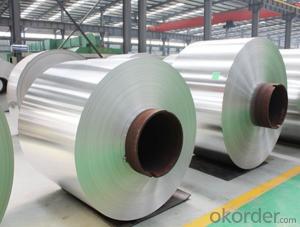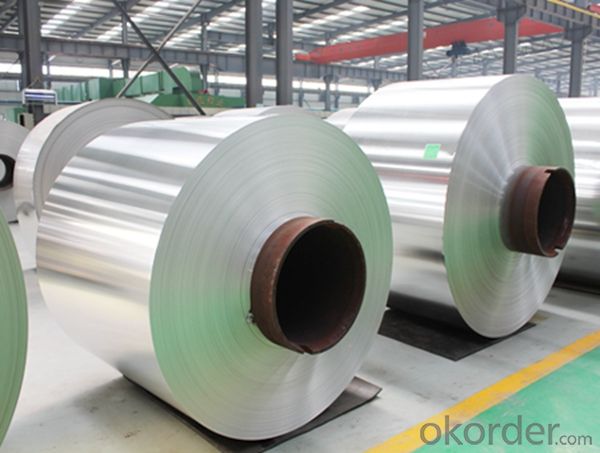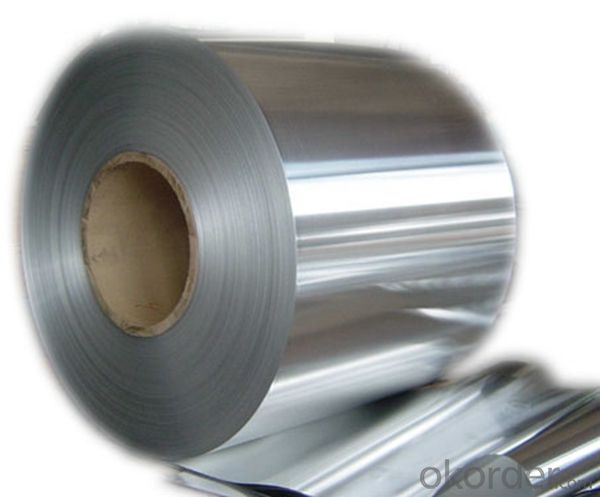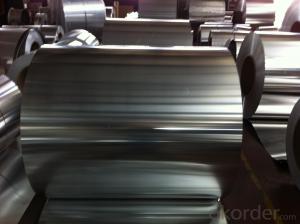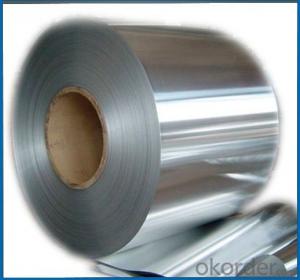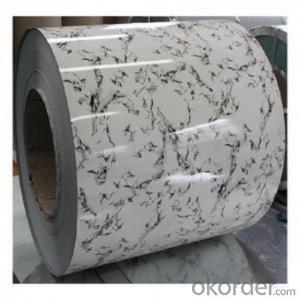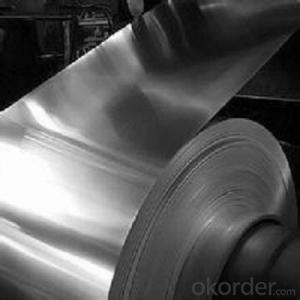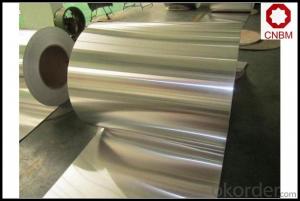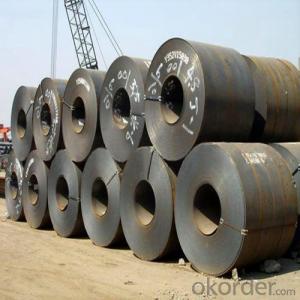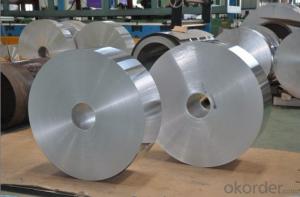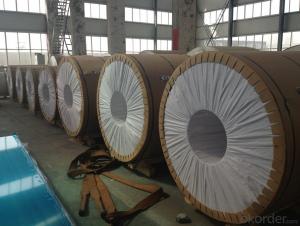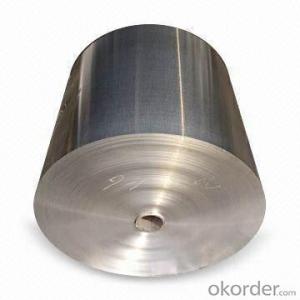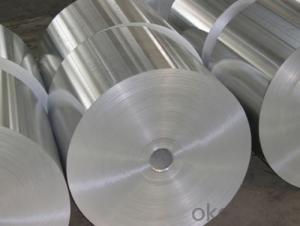Aluminum Coil Wisconsin - Hot Rolled Coil, Cold Rolled Coil, Thick Foil
- Loading Port:
- Shanghai
- Payment Terms:
- TT OR LC
- Min Order Qty:
- 5 m.t.
- Supply Capability:
- 10000 m.t./month
OKorder Service Pledge
OKorder Financial Service
You Might Also Like
Specification
1. Specification of Hot Rolled Coil Aluminium Cold Rolled Coil Thick Foil
characteristics | Application |
1) Super peeling strength | 1) Building exterior curtain walls |
2) Excellent surface flatness and smoothness | 2) Decoration and renovation additions for old buildings |
3) Superior weather, corrosion, pollutant resistance | 3) Decoration of interior walls, ceilings, bathrooms, kitchens and balconies |
4) Even coating, various colors | 4) Shop door decorations |
5) Fireproof, excellent heat and sound insulation | 5) Advertisement board display platforms and signboards |
6) Superior impact resistance | 6) Wallboards and ceilings for tunnels |
7) Lightweight and easy to process | 7) Industrial materials, materials for vehicles and boats |
2. Application of Hot Rolled Coil Aluminium Cold Rolled Coil Thick Foil
(1).Interior: wall cladding, ceilings, bathrooms, kitchens and balconies, shutters, doors...
(2).Exterior: wall cladding, facades, roofing, canopies, tunnels,column covers , renovations...
(3).Advertisement: display platforms, signboards, fascia, shop fronts...
3. Feature of Hot Rolled Coil Aluminium Cold Rolled Coil Thick Foil
*Such coil is specially designed to replace aluminum ingot, due to the high export tax of aluminum ingot, the coil has better price than ingot.
*This type of coil can fit customer's remelting furnace just like ingot, no need to make any change to the production line that was previously used for ingot. The standard coil size and weight is very suitable for the feed gate of furnace.
*This type of coil causes less material wastage than ingot when remelted.
*Our coil is made directly from ore, no need to go though the ingot making process, quality is much better than other suppliers who use ingot scrap to make coil.
Be free from Oil Stain, Dent, Inclusion, Scratches, Stain, Oxide Dicoloration, Breaks, Corrosion, Roll Marks, Dirt Streaks and other defect which will interfere with use
4. Certificate:
SGS and ROHS(if client request, paid by client), MTC(plant provided), Certificate of Origin(FORM A, FORM E, CO), Bureau Veritas and SGS (if client request, paid by client), CIQS certificate
5. Image of Hot Rolled Coil Aluminium Cold Rolled Coil Thick Foil
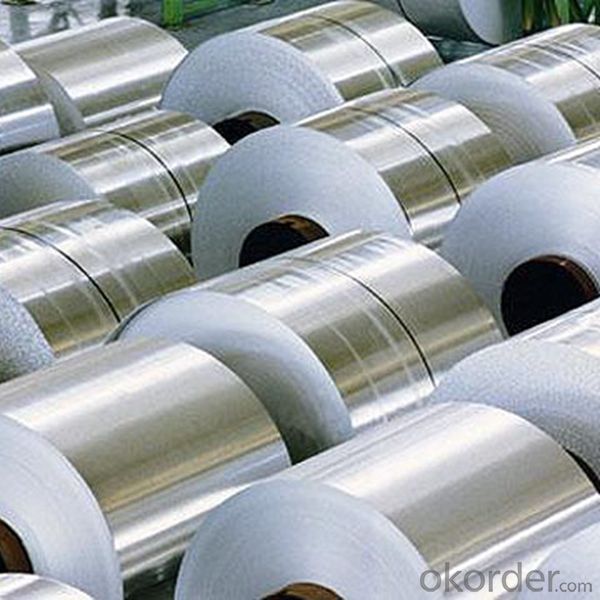
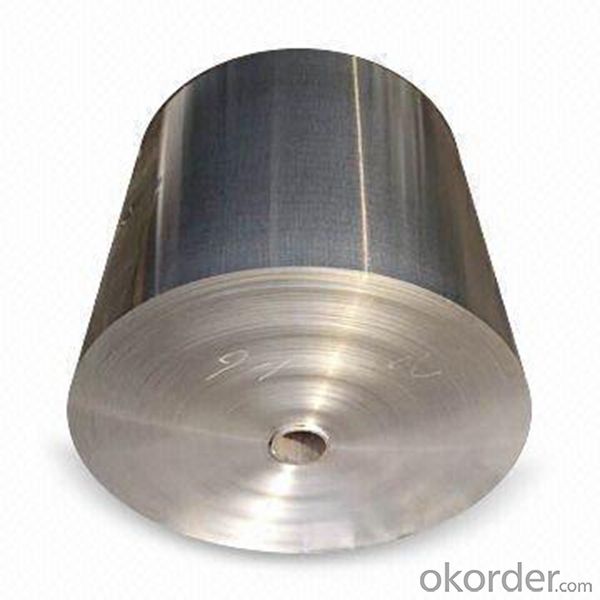
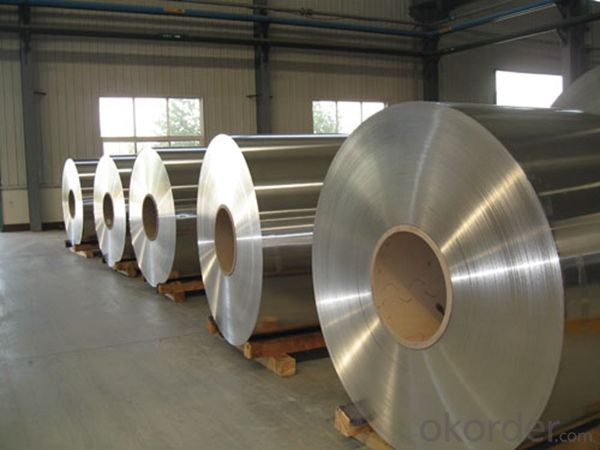
6. Package and shipping of Hot Rolled Coil Aluminium Cold Rolled Coil Thick Foil
eye to wall
eye to the wall
with wood pallet (wooded case also available)
7. FAQ
1) What is the delivery time?
Dpends on actual order, around 20 to 35 days
2)What is the QC system:
We have QC staff of 20 persons and advanced equipment, each production is with MTC traced from Aluminum ingot lot.
3) What market do you mainly sell to?
Australia, America, Asia, Middle East, Western Europe, Africa etc
- Q: How do aluminum coils contribute to energy-efficient windows and doors?
- Aluminum coils play a significant role in making windows and doors energy-efficient. Firstly, aluminum is a highly conductive material, meaning it can efficiently transfer heat and cold. This property allows aluminum coils to act as a thermal barrier, preventing the transfer of heat from the outside to the inside and vice versa. By minimizing heat transfer, aluminum coils help to reduce the amount of energy needed to cool or heat a building, resulting in lower energy consumption and reduced utility bills. Additionally, aluminum coils are often used in the construction of window and door frames due to their lightweight and durable nature. This lightweight property makes it easier to install and operate windows and doors, while their durability ensures long-lasting performance. The use of aluminum coils also allows for the creation of sleek and narrow frame designs, maximizing the glass area and allowing more natural light to enter the building. This reduces the need for artificial lighting during the day, further contributing to energy savings. Moreover, aluminum is a highly recyclable material, and the use of aluminum coils promotes sustainability. By using recycled aluminum to manufacture these coils, energy-efficient windows and doors can be created with a lower carbon footprint. This reduces the environmental impact of the building industry and contributes to a more sustainable future. In conclusion, aluminum coils contribute to energy-efficient windows and doors through their thermal barrier properties, lightweight and durable nature, and recyclability. By minimizing heat transfer, facilitating efficient installation, and reducing the use of artificial lighting, aluminum coils play a key role in creating sustainable and energy-saving building solutions.
- Q: Are there any limitations on the surface treatment of aluminum coils?
- Yes, there are limitations on the surface treatment of aluminum coils. One limitation is the type of surface treatment that can be applied to aluminum coils. Aluminum coils can be treated with various surface finishes such as anodizing, painting, and powder coating. However, not all surface treatments are suitable for all applications. For example, anodizing is a durable and corrosion-resistant finish, but it may not be suitable for applications that require a specific color or design. Similarly, painting and powder coating can provide a wide range of colors and aesthetics, but they may not provide the same level of durability as anodizing. Another limitation is the size and shape of the aluminum coils. Surface treatment processes may have limitations in terms of the size and shape of the aluminum coils that can be treated. For example, anodizing is typically done in tanks or racks, which may have size restrictions. Similarly, painting and powder coating processes may require specific equipment or facilities that may not be able to accommodate large or irregularly shaped coils. Additionally, the condition of the aluminum surface can also impact the effectiveness of the surface treatment. Aluminum coils may have imperfections or surface defects that can affect the adhesion and durability of the surface treatment. Proper cleaning and preparation of the aluminum surface are essential to ensure the effectiveness of the surface treatment. In summary, while there are various surface treatments available for aluminum coils, there are limitations in terms of the type of treatment that can be applied, the size and shape of the coils, and the condition of the aluminum surface. It is important to consider these limitations and select the most suitable surface treatment based on the specific requirements and constraints of the application.
- Q: Can aluminum coils be used for electrical transmission lines?
- Yes, aluminum coils can be and are commonly used for electrical transmission lines. Aluminum has several advantages that make it a suitable choice for transmission lines. First, aluminum is a lightweight material, which makes it easier and more cost-effective to transport and install. Second, aluminum is a good conductor of electricity, with similar conductivity to copper. Third, aluminum is less expensive than copper, making it a more economical option for long-distance transmission lines. However, there are some challenges associated with using aluminum coils in transmission lines. Aluminum has a lower tensile strength compared to copper, which means that it is more prone to sagging over long distances. Additionally, aluminum has a higher thermal expansion coefficient than copper, which can cause issues with thermal expansion and contraction. Despite these challenges, proper design and engineering can ensure that aluminum coils are used effectively and efficiently in electrical transmission lines.
- Q: What are the different tempers available for aluminum coils?
- Aluminum coils have various tempers available, each with its own unique characteristics and properties. Let's explore the most common tempers: 1. O Temper, also known as annealed or soft temper, is the softest and most ductile option. It has low strength but high formability, making it ideal for applications that involve extensive forming or bending. 2. The H temper series includes different levels of work hardening, resulting in increased strength and reduced formability compared to the O temper. The H temper range consists of H1X, H2X, H3X, H4X, H5X, and H6X, with each subsequent number indicating a higher level of work hardening. These tempers are commonly used when moderate to high strength is required. 3. The T temper series, also known as heat-treated tempers, involves thermal treatments to achieve a specific combination of strength and formability. The most common T tempers are T3, T4, T6, and T7. T3 and T4 are solution heat-treated and naturally aged, offering a good balance of strength and formability. T6 and T7 are solution heat-treated and artificially aged, resulting in higher strength but reduced formability. 4. The F temper, also known as as-fabricated temper, is obtained through hot or cold working without subsequent thermal treatments. It provides improved strength and hardness compared to the O temper but is lower than the H and T tempers. These various tempers enable the use of aluminum coils in a wide range of applications, including automotive parts, aerospace components, building materials, and consumer goods. The choice of temper depends on the specific requirements of the application, such as desired strength, formability, and corrosion resistance.
- Q: I am shopping for new Rollerblades and see their newer skates have Aluminum framesand not the composite which I feel is more sturdier. What do you think of the aluminumframes? I was not impressed.
- This Site Might Help You. RE: Rollerblade in line skates-Aluminum frames? I am shopping for new Rollerblades and see their newer skates have Aluminum frames and not the composite which I feel is more sturdier. What do you think of the aluminum frames? I was not impressed.
- Q: How are aluminum coils tested for surface hardness?
- Aluminum coils are typically tested for surface hardness through a variety of methods, including the use of a hardness tester or durometer. These instruments measure the resistance of the coil's surface to indentation or penetration by applying a specific amount of force. The results are then compared to a standardized scale to determine the surface hardness of the aluminum coil.
- Q: Can aluminum coils be used in the aerospace industry?
- Indeed, the aerospace industry finds great utility in aluminum coils. The extensive use of aluminum in this sector is attributed to its advantageous characteristics, including its low density, impressive strength-to-weight ratio, and exceptional resistance to corrosion. The manufacturing of numerous aircraft elements, such as fuselage panels, wings, and structural frameworks, often relies on the employment of aluminum coils. These coils can be effortlessly molded into various shapes and sizes, allowing for design flexibility and a reduction in overall aircraft weight. Moreover, aluminum coils seamlessly integrate with diverse manufacturing techniques like welding, machining, and forming, rendering them a prime selection for the aerospace industry.
- Q: How are aluminum coils used in the aerospace industry?
- Aluminum coils find extensive application in the aerospace industry for various purposes. The construction of aircraft structures is one primary area where aluminum coils are heavily utilized. Aluminum, being a lightweight material with an exceptional strength-to-weight ratio, is an ideal choice for the aerospace industry, where weight reduction is of utmost importance. These coils are often transformed into sheets or plates and employed in the fabrication of aircraft fuselage, wings, and other structural elements. Apart from their structural uses, aluminum coils also find application in the manufacturing of heat exchangers and cooling systems within aircraft. Aluminum's high thermal conductivity and resistance to corrosion make it an outstanding material for dissipating the heat produced by engines and electronic systems. These coils can be molded into tubes or fins, enabling efficient heat transfer and ensuring optimal performance of the aircraft's cooling systems. Another significant application of aluminum coils in the aerospace sector lies in electrical uses. Aluminum, being a good conductor of electricity, is utilized in the production of electrical wiring, connectors, and cables. These components are crucial for the proper functioning of various systems within an aircraft, including power distribution, communication, and navigation systems. Furthermore, aluminum coils are also employed in the construction of fuel tanks and hydraulic systems in aircraft. The corrosion resistance and ability of aluminum to withstand high pressure and temperature make it a reliable choice for these critical elements. By shaping and welding the coils, tanks or piping systems can be created to store and transport fuel and hydraulic fluids effectively and safely. In conclusion, aluminum coils play a crucial role in the aerospace industry by providing lightweight, robust, and corrosion-resistant materials for various applications, including structural, thermal, electrical, and fluid management purposes. Their versatility, durability, and exceptional performance characteristics make them indispensable in the design and construction of modern aircraft, ensuring safety, efficiency, and reliability in air transportation.
- Q: This question asks for methods to clean an aluminum coil, which involves understanding the appropriate cleaning materials and techniques to avoid damaging the aluminum.
- <p>To clean an aluminum coil, start by using a soft cloth or sponge dampened with warm water and mild dish soap. Gently wipe the coil to remove dirt and grime. Avoid abrasive materials or harsh chemicals that could scratch the surface. After cleaning, rinse the coil thoroughly with clean water to remove any soap residue. Dry the coil completely to prevent water spots or corrosion. For stubborn stains, consider using a specialized aluminum cleaner, but always follow the manufacturer's instructions and test on a small area first.</p>
- Q: Is it possible to use aluminum coils in the creation of toys or games for children?
- <p>Yes, aluminum coils can be used to make toys or games for children, but safety considerations must be taken into account. Aluminum is a lightweight, durable, and non-toxic material, making it suitable for various applications, including children's toys. However, it's crucial to ensure that any aluminum used in toys is properly treated to prevent sharp edges or small parts that could pose a choking hazard. Additionally, the toys or games should be designed and manufactured to meet safety standards and regulations to protect children from potential harm.</p>
Send your message to us
Aluminum Coil Wisconsin - Hot Rolled Coil, Cold Rolled Coil, Thick Foil
- Loading Port:
- Shanghai
- Payment Terms:
- TT OR LC
- Min Order Qty:
- 5 m.t.
- Supply Capability:
- 10000 m.t./month
OKorder Service Pledge
OKorder Financial Service
Similar products
Hot products
Hot Searches
Related keywords
